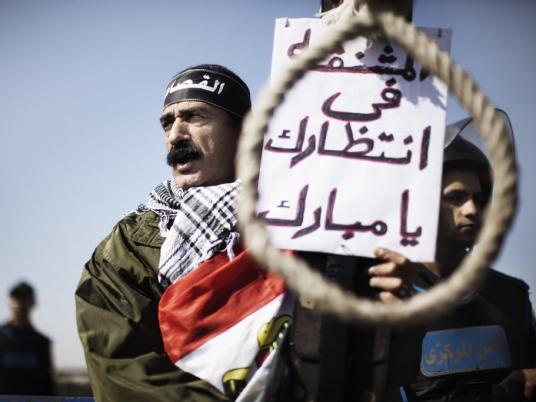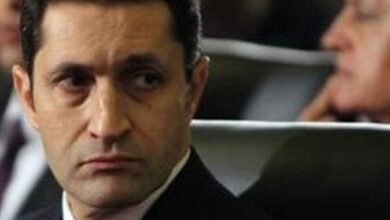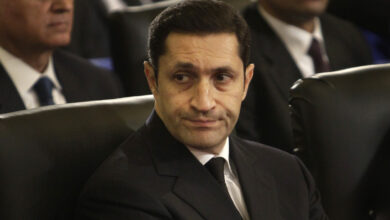
As Egyptians try to make up their minds about who to vote for in the presidential election runoff, one man has a bigger decision to make, which might change the course of this election.
On Saturday, Judge Ahmed Refaat is scheduled to announce his verdict in the trial of fallen President Hosni Mubarak, his two sons and senior officials on charges of killing protesters and financial corruption.
Timed between the unrest created by the unexpected results of the first round of the election and the runoff that would determine Egypt’s next president, Refaat is put in a difficult position in which a decision that he has vowed to make on a strictly legal basis with no regard for public pressure has crucial political implications.
But there is an argument that while the whole legal case was a product of public pressure, its course is not necessarily going to be determined by this pressure.
Sherif Younes, professor of history at Helwan University and writer, sees the Mubarak trial in a more complex light. According to him, the Mubarak trial came as “the middle solution for the revolution that didn’t rule, and the authority that could no longer protect its men under the pressure of the revolutionary forces. This has led this authority to redo its calculations all the time.”
Younes adds that while the traditional authority had to prosecute Mubarak under pressure, it’s doing so under the very legal system that was inherited from him. In other words, no revolutionary courts or special laws are governing the case. So while the case is following a legal course, it’s also mutated by political pressure.
As hundreds took to the street on Monday following the formal announcement of the election’s results, revealing that the race is now between Muslim Brotherhood candidate Mohamed Morsy and Mubarak’s last Prime Minister Ahmed Shafiq, Mubarak’s trial was on their minds.
In between chants denouncing the presence of a leading figure in the Mubarak regime in the first presidential election following his fall, protesters also chanted “execution” as the only verdict that would satisfy them in the Mubarak trial.
“Hanging him is the only thing that will satisfy me; this man has killed young men my age and younger, this blood can’t be wasted in vain,” says Madih, a young director who was protesting Shafiq’s victory in Tahrir Square.
“With Shafiq winning, if Mubarak was acquitted too this means that the revolution was completely wasted and we as young people would look very bad,” he adds.
Some expect the judge to postpone the ruling in order to avoid creating popular unrest ahead of the elections, while others insist that he would carry on with the verdict, whether it will satisfy the public or not, regardless of political calculations.
Legally, the murder case against Mubarak is weak in the absence of any concrete evidence that he gave orders to kill protesters.
The evidence against Mubarak is deductive, according to Hoda Nasrallah, a lawyer with the Egyptian Initiative for Personal Rights. Due to the nature of the criminal court, there is a lot of room for the judge’s interpretations, making it difficult to foresee the verdict.
In the case of financial corruption, however, Nasrallah says that the evidence is stronger against Mubarak.
But in all cases, legal experts see the evidence against Mubarak as insufficient to lead to the death sentence that many say is the only outcome they’ll accept.
Hala Mustafa, chief editor of Democracy Magazine, says that even though Mubarak has become irrelevant as he would never return to the political scene, his trial has symbolic value that will invoke a strong reaction from large sectors.
“The revolutionary forces feel that they haven’t accomplished any victories lately, so they will pay more attention to the verdict,” says Mustafa.
But with the recent outcome of the first round of the presidential election, which many deem as one of the most serious blows to the revolution, little hope is left for a severe ruling against Mubarak.
Ola Shahba, member of the Socialist Popular Alliance party, says that she expects the ruling to be postponed until after the election. Seeing Shafiq’s win as a confirmation that the old regime is still in place, she expects the verdict to be weak and to cause popular anger.
“It’s part of the deal, the regime is back and they’re the ones controlling the scene — why would they punish their head?” she says.
The revolutionary court that Younes referred to is not a fictional invention. Constitutional expert Mohamed Nour Farahat says that following the 25 January revolution, a court should have been established to rule on political corruption cases since 1981. These cases include everything from torturing citizens in custody, rigging elections and others, which cannot be fairly ruled upon in normal courts.
With the little faith that many have in the verdict to be pronounced tomorrow, which is largely based on the weakness of the legal system itself, some people remember that the revolution was fixated primarily on unsettling the executive and legislative branches of the state, while it overlooked the crucial judiciary.
Additional reporting by Mostafa Mohie and Al-Masry Al-Youm Website.




